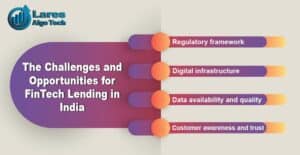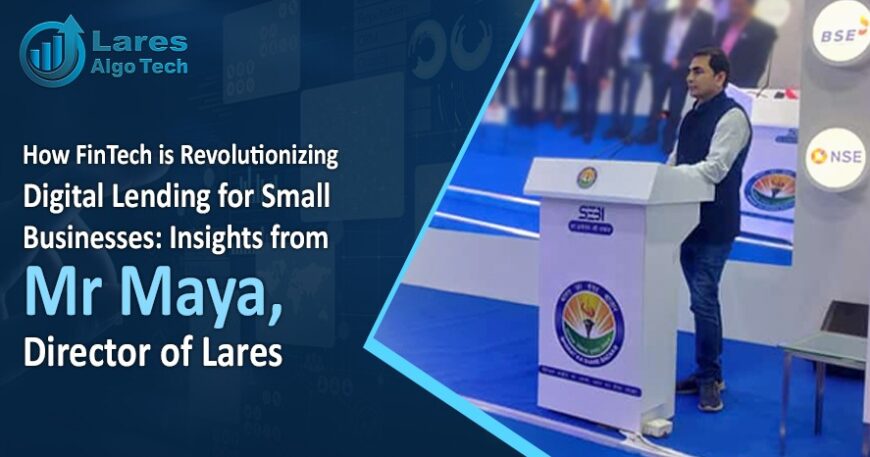Small businesses are the backbone of any economy, contributing to employment, innovation, and growth. However, they often face challenges in accessing credit from traditional financial institutions, such as banks and NBFCs, due to various reasons, such as lack of collateral, inadequate financial records, high interest rates, and lengthy approval processes. These barriers limit the potential of digital lending for small businesses in India to expand, diversify, and compete in the market.
Fortunately, with the advent of technology and innovation, a new breed of financial service providers has emerged, which are leveraging the power of digital platforms, data analytics, artificial intelligence, and blockchain to offer innovative and customized digital lending for small businesses in India. “These are the FinTech companies, which are disrupting the traditional lending landscape and creating a cashless and paperless ecosystem while ensuring transparency and ease of credit availability for small businesses”, said Mr Maya of Lares a leading hedge fund management company.
What are FinTech Companies and How do they work?
FinTech, or financial technology, is the use of technology to deliver financial services and products. These companies use technology to offer innovative solutions for various financial needs, such as digital lending for small businesses, payments, remittances, insurance, and wealth management.
FinTech companies that offer the solution of digital lending for small businesses in India are known as digital lenders. They use online platforms, such as websites and mobile apps, to connect borrowers and lenders, and facilitate the entire lending process, from application to disbursal, in a fast and convenient manner. They also use data-driven algorithms and machine learning models to assess the creditworthiness of borrowers and offer customized loan products, based on the specific needs and profiles of small businesses.
What are the benefits of FinTechs Digital Lending for Small Businesses in India?
FinTech lending offers several benefits of FinTechs digital lending for small businesses in India, such as:

1. Easy access: FinTech lenders have a wider reach and can cater to small businesses across geographies and sectors, even in remote and rural areas, where traditional financial institutions may not have a presence. They also have lower eligibility criteria and documentation requirements and can serve small businesses that may not have a formal credit history or a bank account.
2. Quick approval and disbursal: FinTech lenders use automated and streamlined processes, and can approve loan applications within minutes or hours, and disburse funds within a day or two, compared to the weeks or months that traditional lenders may take. This helps digital lending for small businesses in India to meet their urgent and short-term financial needs and take advantage of market opportunities.
3. Lower interest rates and fees: FinTech lenders use data and analytics to assess the risk and return of each loan, and can offer lower interest rates and fees, based on the credit profile and repayment capacity of small businesses. They also have lower operational costs, as they do not have physical branches or intermediaries, and can pass on the savings to the borrowers.
4. Flexible repayment options: FinTech lenders offer flexible repayment options, such as daily, weekly, or monthly installments, based on the cash flow or revenue of small businesses. They also allow prepayment or foreclosure of loans, without any penalty or charges. This helps small businesses to manage their cash flow and debt obligations more efficiently.
5. Transparency and security: FinTech lenders use digital platforms and channels, such as SMS, email, and chatbots, to communicate with the borrowers, and provide them with real-time information and updates on their loan status, repayment schedule, and outstanding balance. They also use encryption and blockchain technologies to ensure the security and privacy of the data and transactions of the borrowers.
What are the challenges and opportunities for FinTech Digital lending for small businesses in India?
FinTech lending in India is still in its nascent stage but has shown tremendous growth and potential in recent years. As per the reports the Indian Fintech industry’s Total Addressable Market is estimated to be $1.3 Tn by 2025. (reference)

1. Regulatory framework: The regulatory framework for Revolutionizing Digital Lending for Small Businesses in India is still evolving and unclear, and multiple regulators and laws govern different aspects of the sector, such as RBI, SEBI, IT Act, and Consumer Protection Act. There is a need for a more coherent and consistent regulatory framework that can balance the stakeholders’ interests and foster innovation and competition while ensuring consumer protection and financial stability.
2. Digital infrastructure: The digital infrastructure in India, such as internet connectivity, smartphone penetration, digital literacy, and digital identity, is still underdeveloped and uneven, especially in the rural and semi-urban areas, where a large segment of small businesses are located. There is a need for more investment and collaboration among the government, private sector, and civil society, to improve the digital infrastructure and enable greater access and adoption of FinTech lending among small businesses.
3. Data availability and quality: Data is the key ingredient for FinTech lending, as it enables the lenders to assess the creditworthiness and behavior of the borrowers, and offer customized and dynamic loan products. However, the availability and quality of data in India, especially for small businesses, is still limited and fragmented, due to the lack of standardization, interoperability, and verification. There is a need for more data sharing and aggregation platforms, such as account aggregators, credit bureaus, and GSTN, that can provide reliable and comprehensive data for FinTech lenders.
4. Customer awareness and trust: Customer awareness and trust are essential factors for the success of FinTech lending, as they influence the demand and retention of the borrowers. However, many small businesses in India are still unaware or skeptical of FinTech lending, due to the lack of awareness, education, and financial literacy, or due to the fear of fraud, cyberattacks, or hidden charges. There is a need for more awareness and education campaigns, as well as customer feedback and grievance redressal mechanisms, that can increase the awareness and trust of small businesses in FinTech lending.
Conclusion
FinTech lending is a revolutionary and disruptive force that is transforming the way digital lending for small businesses access credit in India. It offers several benefits, such as easy access, quick approval and disbursal, lower interest rates and fees, flexible repayment options, and transparency and security, these kind of benefits you will get through digital lending for small businesses in India, and helps them to overcome the challenges and barriers that they face in the traditional lending system.
However, FinTech lending also faces some challenges and opportunities for FinTech Digital lending for small businesses in India, such as regulatory framework, digital infrastructure, data availability and quality, and customer awareness and trust, that need to be addressed and leveraged, to unleash its full potential and impact.
As Mr Maya, Director of Lares, a leading hedge fund management company in India, I believe that FinTech lending is the future of credit for small businesses. There is an immediate need for all stakeholders, such as the government, regulators, FinTech lenders, traditional lenders, small businesses, and customers, to collaborate and cooperate, to create a conducive and inclusive ecosystem for FinTech lending in India.





